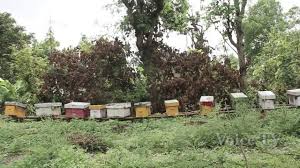Bee-keeping works wonder for Dadeldhura farmers

Man Bahadur Giri of Alital, Dadeldhura made several failed
attempts in the past to get a decent job. Food grown from his small infertile
plot was simply insufficient to feed his family of eight. Giri also didn´t have
fund to invest in other alternatives for income generation.
Ten years down the line, Giri is a successful farmer employing eight local
youths. This became possible only because of beekeeping.
“Beekeeping has not only increased by income level significantly, it has
enabled me to provide employment to local youths in this remote village,” Giri,
40, said.
This transformation became possible because of the support provided by the
Micro-Enterprise Development Program (MEDEP) -- a flagship initiative of Nepal
government and the United Nations Development Program (UNDP) with major
financial contribution from Australian Aid.
Giri's firm -- Alital Beekeeping Farm - produces both honey and bee-hive
frames. MEDEP has been providing entrepreneurship trainings, skill trainings,
and supporting market linkage, giving inputs on new technology for honey
processing and extracting, through cooperatives operated by farmers themselves.
It has been extending necessary trainings and other technical supports for
beekeeping to more than 300 entrepreneurs.
Beekeeping is thriving in Alital as the village is surrounded by dense forest
rich in bio-diversity. It has helped raise income level of local entrepreneurs
and created employment opportunity for local youths.
“I´ve been earning around Rs 800,000 each year from the sales of honey and
bee-hive frames,” Giri said. Giri sells honey produced in his farm at Rs 40,000
per quintal. He sells bee-hive frames with a colony of bees at Rs 5,000 each.
Alital Beekeeping Farm, which currently has 60 hives, produces organic honey as
Giri´s farm is surrounded by lush green hills with medicinal herbs and
indigenous trees like Aesandra butyracea, locally known as Chyuri.
“Over the past decade, I have succeeded in expanding my farm by buying land
plots worth Rs 1.5 million,” Giri said. Thanks to modern skills and techniques
acquired from training along with technical supports from MEDEP, the
seventh-grader has now become a trainer and resource person for beekeeping training
in the far-western region.
“Though I have studied only till middle school, I am getting opportunity to
provide training to different groups of bee farmers in the far-western region,”
he added.
Giri has been failing to give sufficient time in his firm because of his
growing involvement in trainings, seminars and other public participations. He
regularly travels to Baitadi and Darchula from Dadeldhura to participate in
such trainings. In his absence, Giri´s wife and son look after the farm.
Honey produced by Alital Beekeeping Farm is becoming popular in Dadeldhura and
other major cities of the country. Buoyed by the growing demand for his
product, Giri is planning to start export of honey to overseas countries.
With the support of MEDEP, honey produced by the members of the Alital
Beekeepers´ Cooperatives has already received Nepal organic certification. This
has made local beekeepers encouraged.
However, they need to get international organic certification to export honey
in the international market. “We need to get international organic
certification to export our organic honey to overseas markets,” Giri said,
adding, “For that, we need government support.”